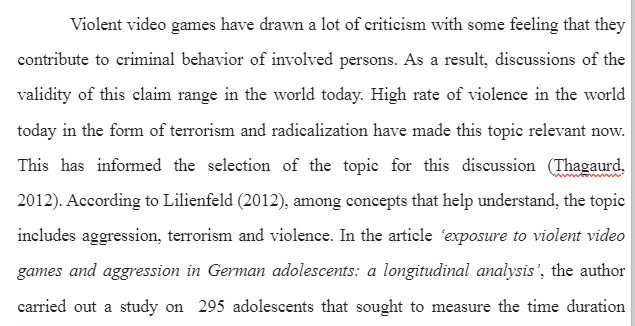Violent Video Games-Psychological Perspectives on Real-World Issues
What current issue has you wondering, “What do others think about this topic? Is there research that supports what people are saying about this topic? What are the experts recommending?” This week, you will examine how psychological science can inform a wide range of current issues beyond what you see in the popular media.
For this Discussion, you will select a current issue of interest and discuss which concepts of psychological science can help you further understand the issue.
To prepare:
Select a current issue (e.g., universal health care, gun control, the environment, HIV/AIDS prevention and control, overuse of social media, violent video games) in which you have interest. Then, think about which psychological concepts would be relevant to your issue. For example, if you are discussing violent video games, you might be interested in the relationship between exposure to the games and aggression, or you might want to look at how the brain responds to the rewarding feeling of playing the game. If you were discussing the impact of social media, relevant psychological concepts might include addiction, isolation, or depression. Find a scholarly journal article related to the topic. This article should be no more than 5 to 7 years old. Visit the Psychwiki.com: Psychology Concepts web page for a list of some psychological concepts.
With these thoughts in mind:
Post by Day 3 , your response to the following:
Briefly describe the issue you selected, and explain why you selected it. Next, explain which psychological concepts are most useful in understanding that issue. Using your selected scholarly article, explain how the psychological concepts were discussed in terms of your chosen issue. Also, describe how the author(s) of the article used psychological concepts to explain, or frame, your selected issue.
Resources to Use:
Lilienfeld, S. O. (2012). Public skepticism of psychology: Why many people perceive the study of human behavior as unscientific. American Psychologist, 67(2), 111–129.
Retrieved from the Walden Library databases.
Foundation for Critical Thinking. (2007). To analyze thinking we must identify and question its elemental structures. Retrieved from http://www.criticalthinking.org/ctmodel/logic-model1.htm#
Huitt, W. (1998). Critical thinking: An overview. Revision of paper presented at the Critical Thinking Conference, Barnsville, GA [March, 1993]. Retrieved from http://www.edpsycinteractive.org/topics/cogsys/critthnk.html
Bell, B. (n.d.). Critical thinking. Retrieved April 11, 2016, from http://www.psychologyandsociety.com/criticalthinking.html
Thagaurd, P. (2012, May 28). What is pseudoscience? [Blog post]. Retrieved from https://www.psychologytoday.com/blog/hot-thought/201205/what-is-pseudoscience
Raff, J. (2013, May 17). What’s the difference between science and pseudo-science? [Blog post]. Retrieved from http://violentmetaphors.com/2013/05/17/whats-the-difference-between-science-and-pseudo-science
Answer Preview-Violent Video Games–The Relationship to Aggression

